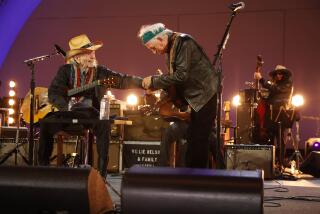Boxcar Willie; Self-Styled Hobo Became Country Music Star at 50
- Share via
Boxcar Willie, the country singer who adopted hobo gear and tooted like a train whistle in songs like “Wreck of the Old 97” and “Hand Me Down My Walking Cane,” died Monday in Branson, Mo., after a three-year battle with leukemia. He was 67 and was a self-described 40-year overnight success, not ascending to the top of the country charts in America until he entered his sixth decade.
“I’ve always done things backassward,” he said in 1982, as his first hit album in the United States, “King of the Road,” hurtled past 1.5 million in sales. “But it works, don’t it?”
The singer, who was born Lecil Travis Martin, ran his own theater in the Ozark Mountains town of Branson. He performed six shows a week at the Boxcar Willie Theater until he was diagnosed with leukemia in 1996. Martin resumed performing after winning that first bout with the disease, but was stricken again last year.
In February, he completed a third round of chemotherapy but was too weak to open the new season at the Branson theater, which started a few weeks ago.
Martin was born in Sterratt, Texas, in 1931. His father, a farmer and section hand on the railway, named him after an old hobo friend named Lecil. As a child, Martin saw many hobos riding the rails on the tracks just six feet away from his family’s shanty. Some of them would knock on his door and offer to chop wood or do other chores in exchange for a meal.
He told different stories about the origins of his stage name, which did not evolve until many years later. One story went that it came to him in a dream he had in the early 1960s. Another was that he once saw an old hobo sitting in a passing freight train in Lincoln, Neb., who looked like a friend of his named Willie. That’s Willie in a boxcar, he thought.
He assembled what would become his trademark get-up--striped bib overalls, red bandanna, scruffy shoes, battered Alpine hat--in the late 1960s. But he kept the gear in a box under his bed until 1975. After that year’s Country Music Assn. awards were handed out to nontraditional country singers, Martin was so disgusted that he took the costume out of mothballs. In his next album, in 1976, he had become Boxcar Willie.
He performed in hundreds of honky-tonks, for nothing or next to nothing. He went on TV’s “Gong Show” to broaden his exposure, winning the talent show in 1977.
His first big break came in the late 1970s, when a Scottish promoter booking a tour of the British Isles caught his act at a Nashville club called Possum Holler. The promoter signed him and later made him the headliner. He was a hit, and soon became one of the United Kingdom’s biggest-selling country artists. His “Daddy Was a Railroad Man” was voted British album of the year in 1979. Later, “King of the Road” sold more than 100,000 copies there.
Back in the United States, however, Martin was still on a slow train to stardom. Lacking the marketing power of a major recording company, he peddled “King of the Road” in TV commercials. The album eventually sold more than 3 million copies.
In 1981, Nashville’s Music City News named him most promising male country singer. He was 50 years old, but he had finally arrived.
In 1982, he added a train whistle to Johnny Cash’s “Bad News” and rose to the top of the country charts. That year he also was voted in as the 60th member of the Grand Ole Opry.
“I once signed autographs for eight hours after a show,” he said in 1982. “Some performers don’t like autographs. I waited 40 years for someone to ask me for mine.”
Martin is survived by his wife, two daughters and two sisters.
More to Read
The biggest entertainment stories
Get our big stories about Hollywood, film, television, music, arts, culture and more right in your inbox as soon as they publish.
You may occasionally receive promotional content from the Los Angeles Times.










